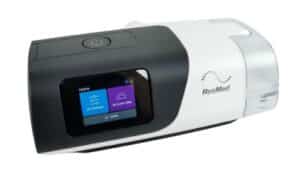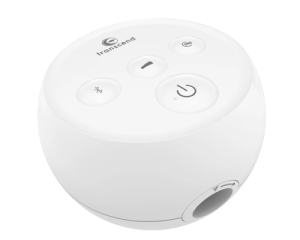- Price: $1,004
- Sound level: 27 dBA
- Dimensions (L x W x H in inches): 10.21 x 3.72 x 5.45
- Warranty: Two years
- Weight: 2.5 pounds
- Standout feature: Bluetooth and cellular connectivity
4 Best CPAP Machines of 2025: Our Expert Picks
Key Takeaways
- Our pick for the “Best CPAP Machine Overall” is the ResMed AirSense 11 AutoSet because of its advanced technology and user-friendly design.
- We looked at size, weight, noise levels, price, warranties, and features in order to recommend the four best CPAP machines.
- The machines in this review range in price from $779–$1,499.
- Of people age 65 and older, more than half have a high risk of obstructive sleep apnea (OSA), but only a portion of those people have been tested for it.
- A diagnosis of sleep apnea increases the risk of developing hypertension, stroke, and heart failure.
During sleep, people with obstructive sleep apnea (OSA) may experience snoring, gasping, or even pauses in their breathing. A diagnosis of sleep apnea increases the risk of developing hypertension, stroke, and heart failure. Researchers found that 56% of people ages 65 and older have a high risk of OSA, but only 8% of those people have been tested for it despite the major health risks that accompany the diagnosis.
Matt Davis, MD, medical director of Patient First MD Advanced Center for Neurodiagnostics and Sleep Dynamics, told us, “The importance of treating sleep apnea is very well understood. CPAP is the gold standard, and even with newer treatments on the horizon, I think CPAP will likely have a major role in the foreseeable future.”
This guide will help you understand different CPAP features, how to get a CPAP prescription, and what to consider when choosing the right machine for your needs.
Best CPAP machines in 2025
- ResMed AirSense 11 AutoSet: Best CPAP Machine Overall
- ResMed AirSense 10 AutoSet: Best Value CPAP Machine
- React Health Luna G3 BiLevel 25A: Best Home CPAP Machine
- Somnetics Transcend Micro Auto: Best Portable CPAP Machine
What we look for in a CPAP machine
We found several important factors when testing CPAP machines, including:

Ease of use
The best CPAP machines are user-friendly, with clear instructions and intuitive controls.

Comfort
A comfortable mask and adjustable settings help ensure users can tolerate wearing the CPAP machine throughout the night without irritation or discomfort.

Noise level
A quiet CPAP machine is crucial for uninterrupted sleep; loud machines can disturb both the user and their bed partner.

Advanced features
The ability to adjust pressure settings and choose different mask styles and sizes allows doctors to personalize the therapy for comfort and effectiveness.
Here are a few examples of advanced CPAP features we consider:
- Climate control: Built-in humidifiers or the ability to add a humidifier can prevent dry mouth and throat irritation, making CPAP therapy more comfortable.
- Data tracking: Machines with data tracking features allow users to monitor their sleep patterns and therapy, which can be shared with health care providers for better treatment adjustments.
- Auto ramp time: Ramp time gradually increases the air pressure to your prescribed level as you fall asleep, making it easier to adjust to the therapy without discomfort.
ResMed AirSense 11 AutoSet: Best CPAP Machine Overall
Our expert take on the ResMed AirSense 11 AutoSet
The ResMed AirSense 11 AutoSet is an advanced CPAP machine designed with automatic features and connectivity options. It has dual functionality as both a CPAP and APAP (automatic positive airway pressure) device. This allows the machine to automatically adjust pressure levels in response to the user’s breathing patterns. This makes it an excellent choice for those who need varying pressure throughout the night.
One of the standout features of the AirSense 11 is that it works with the myAir app, available for both Apple and Android devices. This app gives users detailed insights into their sleep patterns and therapy, while ResMed’s AirView technology allows health care providers to monitor data remotely and make any necessary adjustments. This can help to make the therapy process easier, offering real-time feedback to your health care provider.
We also like the automatic climate control features of this unit. Heated humidification keeps the airways moist, and you may find that inhaling warmed air during sleep feels more natural and soothing than cool or room-temperature air. Some studies suggest that using heated humidification during CPAP treatment can decrease sore, dry throat symptoms and increase CPAP adherence. The automatic climate control keeps air temperature and humidity at your preset levels while you use the CPAP machine.
You may want to consider the optional ClimateLineAir tubing. This tubing can help maintain the warmth and humidity of the heated air as it travels from the machine to the mask. Heated tubing can make the inhalation of humidified air feel more natural and can prevent “rainout,” which occurs when heated air cools as it travels through the tube and condenses into water that can pool in your CPAP mask and on your face.
The Auto Ramp feature gradually increases the air pressure to your prescribed therapeutic level as you fall asleep. The feature detects when you’ve fallen asleep and waits to begin increasing air pressure to avoid the sensation that you’re getting too much air from the CPAP machine. This model also automatically starts or stops the machine when you put on or take off your mask.
At 2.5 pounds (similar to the weight of a quart of milk), the AirSense 11 is one of the lighter sleep apnea machines on our list. It operates at an average noise level of 27 A-weighted decibels (dBA), which measure how our ears perceive the relative loudness of sounds in the air. This level is equivalent to the sound of a whisper.
Who may love it
- Users looking for a machine that combines both CPAP and APAP functionalities
- Tech-savvy individuals who appreciate Bluetooth and cellular connectivity
- Those who value remote monitoring and easy data access through an app
- People who prioritize comfort features like heated humidification and climate control
Who may want to avoid it
- Users looking for a more affordable option
- Users who prefer physical buttons over touchscreen interfaces
Read more in our full ResMed Review.
ResMed AirSense 10 AutoSet: Best Value CPAP Machine
Our expert take on the ResMed AirSense 10
The ResMed AirSense 10 AutoSet stands out as a good option for those looking to manage sleep apnea with a reliable and easy-to-use machine. It has a lower price than the AirSense 11 and still includes essential features that can make CPAP therapy more comfortable and effective. The device’s SmartStart feature and expiratory pressure relief function can make CPAP therapy more comfortable by automatically increasing pressure when you breathe in and reducing pressure when you breathe out.
Although certain AirSense 10 models include smartphone app connectivity, the AirSense 10 AutoSet does not. Users can track and share data through its SD card, which can be used to share therapy information with health care providers. The device is equipped with a color LCD screen and a large control dial, making it easier to see and adjust settings—especially for those who prefer traditional controls over touchscreens.
The AirSense 10 also offers humidification, with a slightly larger water chamber than the AirSense 11, which is easier to grip and remove. The optional ClimateLineAir heated tubing can also improve comfort by maintaining warm, humidified air throughout the night, reducing condensation and moisture buildup. The ResMed AirSense 10 AutoSet offers a balance of performance and affordability, making it a popular choice.
Who may love it
- Users seeking a high-quality CPAP machine at a lower price
- Users who prefer a traditional control dial
- Users who want automatic features like SmartStart and expiratory pressure relief
- Those looking for reliable humidification options to enhance comfort
Who may want to avoid it
- People who want smartphone connectivity and app-based data tracking
- Users who prefer the latest models with the most advanced features
Read more in our full ResMed Review.
React Health Luna G3 BiLevel 25A: Best Home CPAP Machine
Our expert take on the Luna G3 BiLevel 25A
The Luna G3 BiLevel 25A is a bilevel ( BiPAP) machine designed for users who need different pressure levels when they breathe in and when they breathe out. This feature is especially beneficial for those with high-pressure settings, as it allows the pressure to be reduced when you breathe out. This can help make it more comfortable to use the machine during sleep. With a pressure range of 4–25 centimeters of water pressure (cm H2O), this machine can work for a wide range of prescriptions.
The built-in humidifier and heated tubing are standout features of this unit, as they maintain consistent warmth and moisture in the air, preventing dryness and irritation in the airways. This system also helps to avoid “rainout,” a common issue where condensation forms in the tubing due to temperature changes. The Luna G3’s preheat feature ensures that the humidifier water is warmed before therapy begins, which can make it more comfortable to use as you fall asleep.
The Luna G3 offers user-friendly controls with easy navigation via a screen and control dial. It tracks therapy data and alerts users when it’s time to replace filters or other components. The Luna G3 comes with two reusable filters but it can also work with compatible disposable filters.
Who may love it
- People seeking a CPAP machine with advanced humidification and comfort features
- Those who appreciate a user-friendly interface with easy navigation and controls
- Users interested in tracking therapy data
- Sleepers who require high pressure settings and BiPAP therapy
Who may want to avoid it
- People looking for a more affordable option
- Frequent travelers who need a lighter, more portable machine
Read more in our Luna CPAP machine review.
Transcend Micro Auto: Best Portable CPAP Machine
Our expert take on the Transcend Micro Auto Travel CPAP
The Transcend Micro Auto CPAP is the smallest and lightest travel CPAP on our list, designed specifically for users who need a reliable yet highly portable solution for sleep apnea therapy. Its compact size and weight make it easy to pack and carry, offering a discreet and convenient option for on-the-go therapy. The device also includes universal mask compatibility that lets you continue using your preferred CPAP mask.
The Transcend Micro’s different power options can also make travel easier. It comes with an AC power adapter for traditional use and can be paired with an FAA-compliant Transcend Micro PowerAway battery for camping or travel without access to electrical outlets. The battery provides approximately 17.5 hours of use on a full charge, making it a good option for long flights or remote locations.
Although it lacks built-in humidification, the optional Transcend Micro AirMist HME offers a waterless humidification solution that recycles moisture from exhaled breath, providing humidification without the need for distilled water. This feature is compatible with most CPAP masks.
The Transcend Micro operates quietly at 27 dBA and includes a WhisperSoft muffler to dampen sound further. The device also features automatic start and stop with the SleepStart function and a 30-minute drying mode to eliminate moisture from the tubing and mask, keeping the equipment ready for use.
The MySleepDash app allows users to monitor their therapy data, track usage, and share progress with health care providers, providing therapy management even while traveling. With advanced features like the GentleRise Ramp auto ramp time option and AirRelief pressure adjustments, the Transcend Micro can provide a comfortable and effective therapy experience for people who are on the go.
Who may love it
- Frequent travelers and those who need a lightweight and compact machine
- Users seeking a portable device with battery power options for off-grid use
- Those who prefer quiet operation at night
- Users looking for universal mask compatibility and easy maintenance
Who may want to avoid it
- Users requiring integrated humidification
- Those who require BiPAP devices or a higher pressure setting
How we test CPAP machines
To provide the most accurate and comprehensive reviews of CPAP machines, our team undertakes a thorough testing and evaluation process. We are dedicated to understanding each model and brand, focusing on the key factors that impact users’ experiences and treatment. Our approach involves a combination of expert insights, rigorous research, and hands-on testing.
Our team dedicated over 250 hours to in-depth research on CPAP machines, examining nine brands and 12 different models across the category. This research included analyzing technical specifications, features, and performance metrics to determine each machine’s suitability for various types of sleep apnea. We integrated findings from our CPAP survey, which gathered feedback from over 600 CPAP users about their experiences with different devices.
We assessed each CPAP machine based on several key criteria:
- Cost
- Ease of use
- Comfort
- Noise level
- Weight and size dimensions
- Mask compatibility
- Durability
- Humidity control
- Data tracking
- Energy efficiency
These factors were chosen to reflect the needs and preferences of our audience, especially older adults seeking reliable and comfortable sleep apnea treatment solutions.
By combining expert opinions, comprehensive research, customer feedback, and academic insights, we work to make sure that we recommend the best CPAP machines. Our goal is to help people make informed decisions about their sleep apnea treatment options, leading to better sleep quality and improved overall health.
We also had all of our selections medically reviewed by an expert in the field to make sure that each brand and model is appropriate for our readers’ needs.
What is a CPAP machine?
A continuous positive airway pressure (CPAP) machine is a medical device used primarily to treat obstructive sleep apnea (OSA), a condition where the airway becomes blocked during sleep, leading to interruptions in breathing. A CPAP machine delivers a steady stream of air through a mask worn over the nose, or both the nose and mouth, keeping the airway open and allowing for regular breathing throughout the night. This continuous airflow prevents the collapse of soft tissues in the throat, which can block the airway and disrupt sleep.
CPAP machines consist of a motor, a hose, and a mask. The motor generates air pressure, the hose delivers the air, and the mask fits securely over the face to ensure a consistent flow of air. Modern CPAP machines often include features such as adjustable pressure settings, humidifiers, and data tracking to enhance user comfort and monitor treatment effectiveness. The ability to adjust these settings allows users to customize their therapy to suit their specific needs and preferences.
Different types of CPAP machines for sleep apnea
When it comes to treating sleep apnea, several types of CPAP machines are available to meet different needs and preferences. Each type offers unique features and benefits, and your doctor may recommend a certain type based on your sleep apnea. Understanding the differences between these machines can help you make an informed choice about the best one for you.
CPAP machines
CPAP machines are the most common type of sleep apnea device, providing a fixed, continuous stream of air at a prescribed pressure level to keep the airway open during sleep. They are effective for individuals with obstructive sleep apnea and are often recommended as the first line of treatment. Some machines include features like humidifiers and data tracking, to improve comfort and treatment quality.
APAP machines
Automatic positive airway pressure (APAP) machines adjust the air pressure automatically based on the user’s breathing patterns throughout the night. These devices are beneficial for those whose pressure needs vary due to factors like changes in sleeping position or stages of sleep. APAP machines may offer greater comfort for some users by providing the minimum pressure necessary to keep the airway open at any given time, potentially enhancing sleep quality and adherence to therapy.
BiPAP machines
Bi-level Positive Airway Pressure (BiPAP) machines deliver two distinct pressure levels: a higher pressure for when you breathe in and a lower pressure for when you breathe out. This design makes BiPAP machines an option for people who have difficulty exhaling against the continuous pressure of a CPAP machine or require higher pressure settings for effective treatment. BiPAP machines are often prescribed for people with more complex breathing disorders or severe cases of sleep apnea.
Travel CPAP machines
Travel CPAP machines are compact, lightweight versions of standard CPAP devices and are designed for portability and convenience. They are a good option for users who frequently travel or want a lightweight machine that is easy to move. These machines often come with travel-friendly features like universal power adapters and battery options, allowing users to maintain their therapy regimen while away from home without compromising effectiveness or comfort. Read more in our travel CPAP machine review.
What to consider when purchasing the best CPAP machine for you
Finding the right CPAP machine involves considering several factors that can affect your comfort and the effectiveness of the treatment. Since CPAP therapy is often a long-term commitment, choosing a machine that fits your lifestyle and meets your needs is essential. Factors like humidification, noise level, and pressure range can play a crucial role in how well you adjust to the machine and how beneficial the therapy is for your sleep apnea.
Noise level
The noise level of a CPAP machine can significantly impact the user’s and their partner’s sleep quality. Our survey of 600 CPAP users found that noise level was the most important feature to the majority of respondents. Most modern machines are designed to operate quietly, below 30 dBA, minimizing disruption during sleep. However, the noise level can vary between models, so consider how much noise you are comfortable with when selecting a machine. A quieter device can make the adjustment period smoother, especially for light sleepers or those who are sensitive to noise. Checking reviews and specifications for noise levels can help ensure you choose a machine that won’t disturb your sleep environment. All of the devices on our list operate under 28 dBA, roughly the sound of a whisper.
Price and budget
Price was the second most important feature to our survey respondents. CPAP machine costs can vary widely, ranging from $250 to more than $2,000, depending on the brand, features, and included accessories. When budgeting for a CPAP machine, consider the initial purchase price and the ongoing costs of essential accessories like masks, tubing, and filters. Some machines come with advanced features that justify a higher price, while others offer basic functionality at a more affordable cost. It’s important to balance your budget with the features you need for effective therapy. Be sure to check with your health insurance provider to see if your plan covers part or all of the cost, which can significantly reduce out-of-pocket expenses.
Pressure range
The pressure range of a CPAP machine determines how much air pressure the device can deliver to keep your airway open. Different models offer various pressure ranges, which should match the prescription provided by your health care provider. Machines with a wide pressure range and the ability to adjust settings offer greater flexibility, allowing users to customize their therapy to accommodate changes in their prescription. Choosing a machine that can deliver the appropriate pressure level is crucial for effectively managing sleep apnea and getting restful sleep.
Portability
Portability is an essential consideration for users who travel frequently or need to transport their CPAP machine between different locations. Compact and lightweight models with travel-friendly features like carrying cases, universal power supplies, and battery options make it easier to maintain therapy when you are not at home. A lighter-weight CPAP device is also important if you need to move it to a different room in your home, even if you don’t plan to travel with it.
Extra features
CPAP machines often come with additional features designed to enhance comfort and therapy effectiveness.
Wireless connectivity and data-tracking
Some CPAP devices come with Bluetooth, Wi-Fi, or cellular connection options that allow you to track and share your data automatically, either through a mobile app or with your doctor directly. Data-tracking capabilities allow users to monitor their sleep patterns, adherence, and therapy effectiveness, providing valuable insights that can be shared with health care providers. Certain devices that do not include wireless connectivity instead come with an SD memory card that can record your data, and then you bring the card to your doctor to share the information.
Climate control
Climate control options manage the temperature and humidity of the pressurized air, providing a more comfortable experience and preventing condensation in the tubing. Humidification is an important feature to consider in a CPAP machine, as it adds moisture to the air, reducing dryness and irritation in the nasal passages and throat. Many machines have built-in or optional humidifiers with adjustable settings, allowing users to tailor the humidity level to their comfort. This feature can be particularly beneficial for users who experience nasal congestion or dryness, as well as those who live in dry climates. Proper humidification helps prevent issues like dry mouth and nosebleeds, making therapy more comfortable and increasing the likelihood that you continue using the device.
Auto-ramp
The auto-ramp feature starts with a lower air pressure to enhance comfort as you fall asleep. It gradually increases the pressure to your prescribed therapeutic level once the machine detects you’ve fallen asleep. This feature helps reduce the initial sensation of high airflow, making it easier to transition into sleep and improving overall comfort and compliance with therapy.
Accessories for CPAP machines
CPAP machines have various accessories that can enhance comfort, convenience, and effectiveness. These accessories range from essential items, like masks and filters, to optional enhancements, such as specialized pillows and cleaning devices.
Necessary CPAP accessories
- CPAP masks: CPAP masks are available in different styles (nasal, full-face, nasal pillows) to suit various comfort and breathing needs
- CPAP tubing: Connects the machine to the mask, which is essential for delivering pressurized air
- Filters: Keep the air clean by trapping dust and allergens, ensuring the machine runs efficiently
Additional CPAP accessories
- Humidifiers: Often built-in or attachable, they add moisture to the air to prevent dryness and irritation
- CPAP pillows: Designed to accommodate the mask and tubing, improving comfort and reducing mask shifting during sleep
- Extra batteries: Useful for travel or power outages, ensuring uninterrupted therapy
- Cleaning supplies: Specialized wipes or cleaning machines that simplify regular maintenance and hygiene
- Mask liners: Add a layer of fabric between the mask and skin, enhancing comfort and reducing irritation or leaks
How to purchase a CPAP machine
Purchasing a CPAP machine involves several steps to ensure you receive the right device for your needs. Since CPAP machines are medical devices, you need a prescription from a health care provider in order to purchase one. This prescription includes the specific pressure settings necessary for your therapy, determined through a sleep study conducted either in a sleep clinic or at home. Home sleep tests have become a popular option for diagnosing sleep apnea, as they offer the convenience of monitoring sleep patterns in a familiar environment. You can arrange these tests through your doctor or a sleep specialist.
Lofta offers an at-home sleep apnea test designed to determine whether you might qualify for a diagnosis. It can be a convenient way to measure specific sleep metrics associated with sleep apnea from the comfort of your own home before speaking with a doctor.
Once you have a prescription, you can purchase a CPAP machine from various sources, including your doctor’s office, medical supply stores, online retailers, and sometimes directly from manufacturers. When selecting a vendor, consider factors such as return policies, warranty options, and customer service support, as these can impact your overall satisfaction with the purchase. It’s also helpful to research different machine models and read reviews to ensure you choose a device that aligns with your prescribed requirements and personal preferences.

To purchase a CPAP machine in-store, you will need your prescription on-hand, or your doctor must submit it to the retailer. To purchase a CPAP device online, you must provide proof of your prescription during checkout.
In addition to the CPAP machine, you’ll need to select compatible accessories, such as masks, tubing, and filters, which may also be included in the prescription. Some health insurance plans cover the cost of CPAP machines and accessories, so check with your insurance provider to understand your coverage options. Work closely with your health care provider and the vendor to ensure you receive the correct equipment and settings for effective sleep apnea treatment. This helps optimize your therapy and contributes to better sleep quality and overall health.
How much do CPAP machines cost?
The cost of CPAP machines can vary widely, typically ranging from $250 to more than $2,000, depending on the brand, features, and included accessories. Basic models are more affordable but may lack advanced features like auto-adjusting pressure or humidifiers, which are available in higher-end models. In addition to the machine, you should factor in the cost of essential accessories such as masks, tubing, and filters, which can add up to $100–$300 annually. Insurance often covers a portion of these costs, but check with your insurance provider to understand your specific coverage and any out-of-pocket expenses. Some suppliers offer payment plans or financing options to help make CPAP therapy more accessible.
Are CPAP machines covered by insurance?
CPAP machines are often covered by insurance, including Medicare and Medicaid, as they are considered essential medical equipment for treating sleep apnea. Most private insurance plans cover CPAP machines and related accessories, but the extent of coverage and out-of-pocket costs can vary depending on the plan. Typically, insurance will require a prescription and documentation from a sleep study to approve coverage.
Medicare Part B covers CPAP therapy if you have been diagnosed with OSA through a sleep study. Medicare usually covers 80% of the machine cost after you meet the Part B deductible, with the remaining 20% being your responsibility or covered by supplemental insurance. Medicaid coverage for CPAP machines varies by state, but many states offer similar coverage to Medicare, including the cost of the machine, masks, and supplies. Read more in our CPAP machine Medicare coverage guide.
To maximize your coverage, it’s essential to work closely with your health care provider to ensure all necessary documentation is submitted and verify your insurance plan’s specific terms. Understanding your plan’s requirements and benefits can help you navigate the process and reduce out-of-pocket expenses. Some suppliers can assist with insurance paperwork, simplifying the process of obtaining a CPAP machine.
Table 1, Compare the best CPAP machines of 2025
|
ResMed AirSense Auto 11
Check Price
|
ResMed AirSense 10
Check Price
|
Luna G3 BiLevel 25A CPAP
Check Price
|
Transcend Micro Auto Travel CPAP
Check Price
|
|
|---|---|---|---|---|
| Price | $1,004 | $960 | $1,499 | $779 |
| Weight (pounds) | 2.5 | 2.75 | 3.74 | 48 |
| Dimensions in inches (L x W x H) | 10.21 x 3.72 x 5.45 | 10.04 x 4.57 x 5.91 | 10.4 x 5.7 x 4.5 | 3.6 x 3.6 x 2.4 |
| Noise level (dBA) | 27 | 26.6 | 28 | 27 |
| Battery Life | Two | Two | Two | Two |
| FAA Compliant | Yes | Yes | Yes | Yes |
Bottom line
Choosing the right CPAP machine is crucial for effective sleep apnea therapy. The ResMed AirSense 11 AutoSet offers advanced features and functions, making it our pick for best overall. The ResMed AirSense 10 AutoSet provides many advanced features at a slightly lower price. The Luna G3 BiLevel 25A stands out as the best home machine with its advanced comfort features. The Transcend Micro Auto is a good travel option because of its small size and weight. By carefully considering your needs and treatment preferences, you can select a CPAP machine that delivers effective therapy for a better night’s sleep.

Frequently asked questions
Yes, you need a prescription to purchase a CPAP machine. The prescription includes the pressure settings for your machine as determined by a sleep study. This requirement helps ensure you receive the appropriate pressure settings and type of machine for the most effective treatment of your sleep apnea.
CPAP machines typically last between three to five years with regular use and proper maintenance. The lifespan can vary based on the machine’s quality, frequency of use, and maintenance, such as regular cleaning and timely replacement of parts like filters and tubing. It’s important to check with your manufacturer or supplier for specific directions on maintenance and replacement.
One popular alternative to CPAP therapy is the use of oral appliances, which are custom-fitted devices worn in the mouth to reposition the jaw and keep the airway open during sleep. These devices can be more comfortable and easier to use for some people, especially those with mild to moderate sleep apnea. They are not suitable for everyone as they can cause jaw misalignment in certain cases.
Another alternative is the Inspire sleep apnea device, an implantable device that stimulates the hypoglossal nerve to prevent airway blockage by keeping the tongue and other muscles in place. Inspire is typically considered for patients with severe OSA who cannot tolerate CPAP therapy.
A final option is eXitOSA, a non-invasive tongue-strengthening device. It delivers electrical stimulation during short daytime sessions, typically around 20 minutes, helping to maintain an open airway during sleep without needing to wear a device overnight. eXitOSA could be an option for people with mild to moderate obstructive sleep apnea and those seeking an alternative to traditional CPAP therapy.
Have questions about this review? Email us at reviewsteam@ncoa.org.
Sources
- the internet at https://www.heart.org/en/health-topics/sleep-disorders/sleep-apnea-and-heart-disease-stroke
- Björnsdóttir E, et al. The Prevalence of Depression Among Untreated Obstructive Sleep Apnea Patients Using a Standardized Psychiatric Interview. Journal of Clinical Sleep Medicine. Jan. 15, 2016. Found on the internet at https://jcsm.aasm.org/doi/10.5664/jcsm.5406
- AASM Foundation. Study Finds High Rate of Undiagnosed Sleep Apnea in Older Adults. May 11, 2018. Found on the internet at https://foundation.aasm.org/aasm-foundation-study-published-jags/
- Soudorn C, et al. Effect of Heated Humidification on CPAP Therapy Adherence in Subjects With Obstructive Sleep Apnea With Nasopharyngeal Symptoms. Respiratory Care. September 2016. Found on the internet at https://rc.rcjournal.com/content/61/9/1151
- Aesthetic Dental Associates. BiPAP Sleep Apnea Treatment. Found on the internet at https://www.aestheticdentalassoc.com/services/sleep-dentistry/bipap-treatment/
- NCOA CPAP Survey. 600 respondents. Conducted using Pollfish. Launched July 25, 2023.







